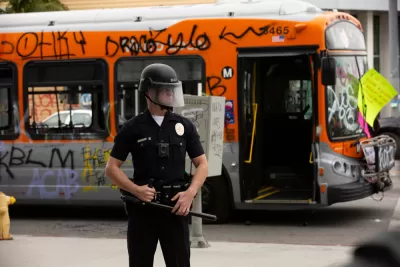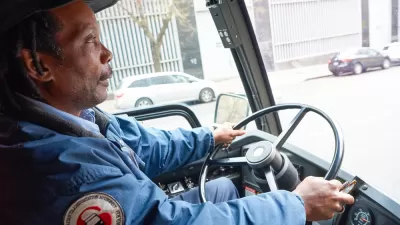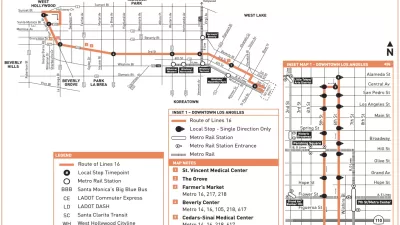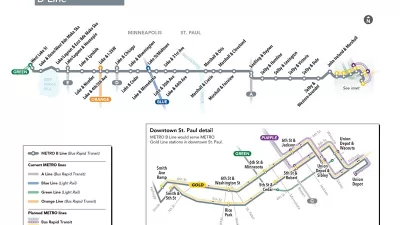The optics of public transit suffered over the weekend, as a few transit agencies have been commandeered by police and even shut down entirely with little or no notice, stranding protesters and essential workers alike.

Public transit has been on the frontline in recent days of unrest in the United States, as police have used buses to transport arrested protesters to jail, but not without meeting resistance from bus drivers who don't want to play that role as a wave of peaceful protests and outbreaks of destruction and violence has swept the nation.
Bus drivers around the country have refused to drive buses full of protesters in custody, and the New York bus drivers union collectively refused to work in that capacity, as did the bus drivers union in Minneapolis.
In another chapter of transit's roles in the upheaval, transit has been played like a chess piece in the conflict. The Los Angeles County Metropolitan Transportation Authority (Metro) shut down all service on the evening of May 30 and early morning of May 31, stranding both protestors and essential workers.
A statement from Metro CEO Phil Washington explained the decision:
“In consultation with Metro Board Chair James T. Butts and in response to L.A. Mayor Garcetti’s directive today to implement a curfew in downtown Los Angeles to help ensure public safety during the George Floyd protests, LA Metro is suspending bus and rail service in the affected protest areas to ensure the safety of both the public and LA Metro employees. This service suspension will become effective immediately and last until 5:30 a.m. [May 31] per curfew guidelines.”
To mitigate some of the collateral damage of the decision, "Metro officials reissued some buses to pick up stranded passengers in specific areas of Los Angeles, and staffers made the rounds to notify riders of the suspension and encourage them to make other arrangements as a result of the emergency," according to an article published by NBC Los Angeles.
Metro issued an apology on May 31, but critics of the decision predicted that the shutdown of service, followed by the use of buses to transport arrested protestors, would have a lasting effect on public trust in the Metro system, as expressed by sources quoted in an article by Laura J. Nelson for the Los Angeles Times.
Los Angeles isn't the only city in the country with a large public transit system operating at diminished capacity as a crowd control measure during the unrest. Chicago is limiting transit access to the Loop and downtown, and also added to the surreal optics of the weekend by raising bridges over the Chicago River in downtown.
FULL STORY: ‘We’re not driving the bus for the cops to arrest protesters’: Bus drivers across U.S. defy police

Planetizen Federal Action Tracker
A weekly monitor of how Trump’s orders and actions are impacting planners and planning in America.

Map: Where Senate Republicans Want to Sell Your Public Lands
For public land advocates, the Senate Republicans’ proposal to sell millions of acres of public land in the West is “the biggest fight of their careers.”

Restaurant Patios Were a Pandemic Win — Why Were They so Hard to Keep?
Social distancing requirements and changes in travel patterns prompted cities to pilot new uses for street and sidewalk space. Then it got complicated.

Platform Pilsner: Vancouver Transit Agency Releases... a Beer?
TransLink will receive a portion of every sale of the four-pack.

Toronto Weighs Cheaper Transit, Parking Hikes for Major Events
Special event rates would take effect during large festivals, sports games and concerts to ‘discourage driving, manage congestion and free up space for transit.”

Berlin to Consider Car-Free Zone Larger Than Manhattan
The area bound by the 22-mile Ringbahn would still allow 12 uses of a private automobile per year per person, and several other exemptions.
Urban Design for Planners 1: Software Tools
This six-course series explores essential urban design concepts using open source software and equips planners with the tools they need to participate fully in the urban design process.
Planning for Universal Design
Learn the tools for implementing Universal Design in planning regulations.
Heyer Gruel & Associates PA
JM Goldson LLC
Custer County Colorado
City of Camden Redevelopment Agency
City of Astoria
Transportation Research & Education Center (TREC) at Portland State University
Camden Redevelopment Agency
City of Claremont
Municipality of Princeton (NJ)





























